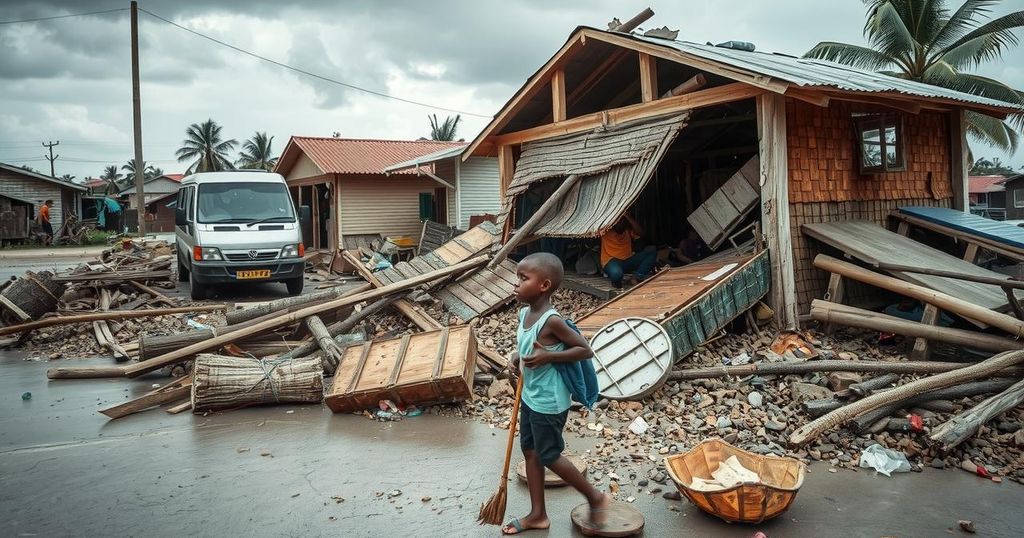Urgent Humanitarian Crisis Following Cyclone Chido’s Devastation in Mozambique

Cyclone Chido has caused widespread devastation in Mozambique, affecting over 90,000 children and destroying thousands of homes. The cyclone, which struck Cabo Delgado province, has raised concerns about increased waterborne diseases and food insecurity as children continue to face numerous challenges in an already affected region. Urgent humanitarian assistance is needed to address the aftermath and long-term impacts of this disaster.
Cyclone Chido has wreaked havoc in Cabo Delgado province, Mozambique, causing the destruction of over 35,000 homes and affecting upwards of 90,000 children. The cyclone struck on December 17, 2024, resulting in significant damage to educational and health facilities, with at least 186 classrooms and 20 health centers rendered unusable. The region is already facing several adversities, including conflict and disease outbreaks, complicating the response to this latest disaster.
UNICEF representative Mary Louise Eagleton emphasized the pre-existing challenges faced by children in Mozambique: “Mozambique is considered one of the most affected countries in the world by climate change…” As emergency humanitarian efforts are mobilized, the worsening situation indicates that the risks of waterborne diseases will increase due to compromised infrastructure and potential cholera outbreaks, particularly as the nation confronts an ongoing cholera crisis.
The cyclone’s impact extended beyond Cabo Delgado, affecting neighboring Nampula and Niassa provinces, leading to power outages for over 25,000 families. Furthermore, alarming projections indicate that up to 3.3 million people in Mozambique could face severe food insecurity next year, especially exacerbated by El Niño effects. These cumulative disasters highlight the urgent humanitarian needs of approximately 4.8 million individuals in the country, with 3.4 million of those being children.
The frequency and severity of climate-related events in Eastern and Southern Africa have escalated, with Cyclone Chido being another example among the growing trend of destructive storms in the region. UNICEF continues its efforts to assist vulnerable communities and children in coping with these challenges. Their immediate funding appeal indicates a pressing need for US$10 million to support the multifaceted humanitarian response due to Cyclone Chido’s impact.
The devastation caused by Cyclone Chido in Mozambique represents a continuation of a troubling pattern of environmental crises impacting vulnerable populations, particularly children. Mozambique has been grappling with extreme weather events, exacerbated by climate change, leading to prolonged cycles of conflict and humanitarian emergencies. The Cabo Delgado region, in particular, has been struggling with both natural disasters and violence, resulting in significant displacement and social instability. With ongoing cholera outbreaks and high levels of food insecurity further complicating the situation, the cyclone’s arrival poses additional threats to an already dire humanitarian landscape that demands urgent attention and resources.
In summary, Cyclone Chido has inflicted severe damage across northern Mozambique, displacing countless families and impacting the lives of over 90,000 children. The cyclone’s arrival highlights the urgency of humanitarian responses amid escalating crises due to climate change, conflict, and disease. As UNICEF and various organizations mobilize to mitigate the impacts, there is an imminent need for financial support and coordinated action to address the comprehensive challenges faced by affected populations, particularly the children of Mozambique.
Original Source: reliefweb.int






